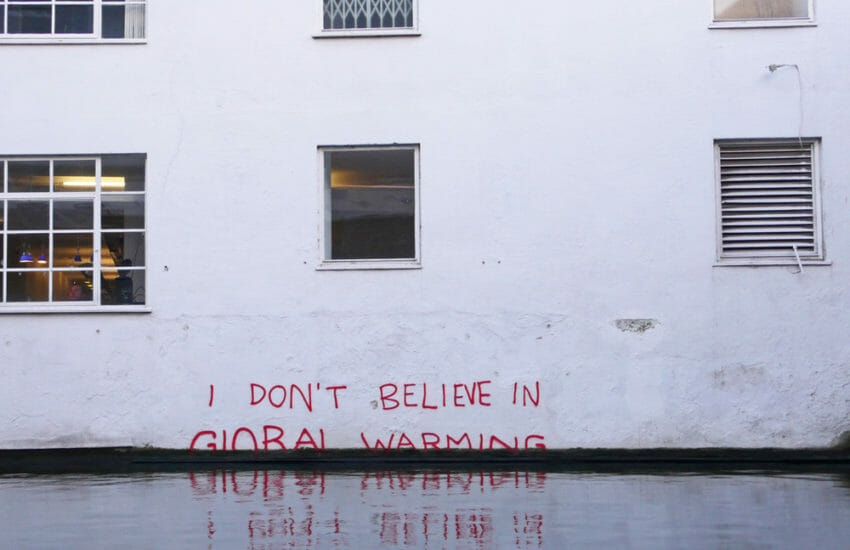
Natasha Hakimi Zapata, Assistant Editor and Poetry Editor, July 23, 2018
While in many parts of the world climate change is seen as scientific fact backed by 90 percent to 100 percent of experts, in the United States it is a fraught political issue that helps to wedge the partisan divide that these days feels like it could swallow the nation whole. Just look at the way Scott Pruitt, the disgraced former head of the Environmental Protection Agency, approached the phenomenon—like something to be argued in binary terms in a “red team, blue team” debate.
But for those of us alive in the year 2018, it hardly feels debatable climate change is real and it is having a very real impact on our everyday lives. From the food we eat to the air we breathe, rising global temperatures are affecting seemingly everything. Staple foods such as rice are becoming less nutritious. Wine, coffee and chocolate producers are struggling to deal with morphing conditions. Seasons as we once knew them are shifting. Internet infrastructure in the U.S. could soon be flooded. Flora and fauna alike are suffering changes that threaten their very survival. And the list goes on and on.
With the exception of the Pentagon, which seems to understand that global warming is a serious national security threat, the Trump government goes beyond just ignoring the issue. It actively denies scientific facts and erases mentions of climate change from government websites as it slashes funds for renewable energy and tries to revive the fossil fuel industry (and more importantly, their CEOs’ and investors’ profits). Meanwhile, there are already climate refugees in the U.S., not to mention numerous political crises stemming from environmental problems causing human displacement across the globe.
For a while now, many Americans appeared unfazed or oblivious to the grave threat that climate change poses to the planet and everything on it. Even last year’s catastrophic wildfires, hurricanes, mudslides and record cold winters did little to shift the national consciousness, perhaps in large part because of mass media’s dearth of climate reporting.
However, two recently released studies paint a new, somewhat hopeful picture of Americans’ thoughts on climate change. One survey, carried out during a heat wave that hasn’t let up, reveals an evolution in thinking not just on the existence of global warming, but on the factors that caused it, according to The Guardian.
A long-running survey of American attitudes to climate change has found that 73% of people now think there is solid evidence of global warming. A further 60% believe that this warming is due, at least in some part, to human influences.Both of these findings are record highs in a twice-yearly survey that has been conducted by the University of Michigan and Muhlenberg College since 2008. The latest poll was conducted during May, which was hotter than any May recorded in the contiguous US in 124 years of record keeping, according to the National Ocean and Atmospheric Administration, eclipsing the 1930s during the Dust Bowl era.
Another study looked into the politics behind Americans’ thinking on the subject and found some heartening results, according to Futurity.
Researchers surveyed 2,000 adults and discovered that across party lines, there is general agreement that climate change is real, that it is caused by human activity, and that something should be done to mitigate it.The study also reveals that people are more likely to support the same climate policy proposal when they think that their own political party supports it. Further, both Democrats and Republicans overestimate how much their peers oppose the ideas of the other party.“Democratic and Republican citizens alike evaluate a carbon tax or cap and trade policy based on who proposed it—above and beyond their thoughts on the details of the policy, or on whether it is consistent with their beliefs about the importance of climate change,” says David Sherman, a professor of psychological and brain sciences at the University of California, Santa Barbara, and senior author of the paper, which appears in Perspectives on Psychological Science.
The change of heart is coming none too soon. Countless studies show that if we’re going to act on climate change, we need to do so with expediency before the effects become permanent and irreversible. If the heat’s not keeping you up at night, the thought of an environmental point of no return absolutely should.
Thankfully, the kids already get it: Just look at Saturday’s youth-led climate march, in which hundreds of young Americans in Washington, D.C., and elsewhere protested government inaction on one of the most pressing issues of our time. Now if only the grown-ups can fully get past their stubborn politics to listen, learn and, most importantly, act like all our lives depend on it.












Đăng nhận xét